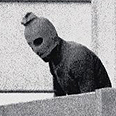
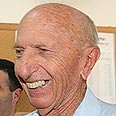

On September 5, 1972 at 8:45 am the Foreign Ministry in Jerusalem received an urgent cable from the Israeli Embassy in the German city of Bonn: The rumors, conflicting reports and general uncertainty had turned into an awful reality – a terrorist attack in Munich against the Israeli delegation to the Olympic Games.
"According to a statement issued by the police, at 5 am this morning, a Palestinian group armed with machine guns attacked the Israeli Olympic delegation at the Olympic village in Munich," the historic cable read.
Related stories:
- 'Neo-Nazis aided Munich Olympics massacre'
- Israel marks 40th anniversary of Munich massacre in London
- Germany cooperated with Black September after Munich Massacre
"According to an initial report the Arabs who infiltrated the delegation's residence killed the Israeli coach and apparently injured others. The assailants are holding hostages and are demanding to release Arabs, probably (held) in Israel. The police have blocked the area and the police commander is conducting negotiations with the kidnappers. The reports are unclear; Consul Shamir is making his way to the village," it read.
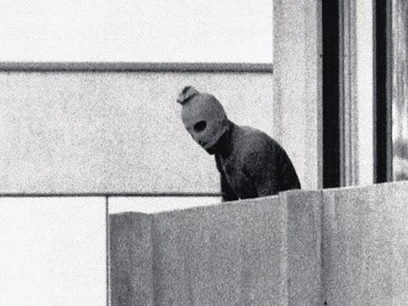
One of the terrorists at the Olympic village apartment (Photo: AP)
The cables are part of a collection of 45 documents that were released by the Israel State Archives on the 40th anniversary of the massacre. The documents, which include cabinet meetings, ministerial consultations, meetings of the Knesset Foreign Affairs and Defense Committee, reports and exchanges of cables, present the Israeli government's actions during the development of the drama, from its beginning until the conclusion and the aftermath.
The documents, which were written with a typing machine and remained classified for decades, describe the events behind the scene as they unfolded: How Israel followed the failed rescue mission, how the head of Mossad Zvi Zamir closely monitored the rescue mission and witnessed the massacre with his own eyes, the mixed feelings in Israel toward German authorities and the great anger toward the Olympic Committee, which decided to continue with the games.
'No negotiations with terrorists'
The drama in Munich began at 5 am, when eight Palestinian terrorists infiltrated the rooms of the Israeli athletes in the Olympic village. Moshe Weinberg and Yossef Romano were killed on the spot, and nine other athletes were taken as hostages. The kidnappers demanded the release of 200 Palestinians held in Israeli jails and their own safe passage out of Germany, or else they would execute two hostages every couple of hours.
According to the documents, the initial news about the attack in Munich reached the Israeli Foreign Ministry from the embassy in Bonn at 8:45 am on 5 September 1972, and was forwarded to Prime Minister Golda Meir, Minister of Education and Culture Yigal Allon (whose office was responsible for the Olympic team), and Minister of Defense Moshe Dayan.
At 9:30 am, a special meeting of the government was convened, sitting as the Ministerial Committee for Security Matters. At the meeting Eban reported the first instructions transmitted, with the consent of Meir, to the Israeli ambassador in Bonn: the government of Israel does not negotiate with terrorists and expects the government of the Federal Republic of Germany (West Germany) to make every effort to rescue the hostages.
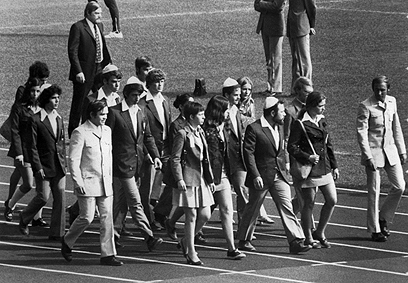
Israeli delegation during memorial ceremony in Munich (Photo: AFP)
The negotiations between the terrorists and the German police lasted until 9 pm, when the kidnappers agreed to be transferred, together with the hostages, in helicopters to a military airfield near Munich, where a plane would be awaitingto take them to Cairo. This was intended to decieve them and make it possible for a Bavarian police unit, which was waiting at the airfield, to kill the terrorists and rescue the hostages. However, when a few of the terrorists stepped out of the helicopter to examine the planes on the airfield, German snipers opened fire at them, leading to an exchange of fire between the kidnappers and the German police. The terrorists blew up one of the helicopters, and shot to death the hostages in the other helicopter. All the hostages were killed.
While the drama was unfolding, Ambassador Elyashiv Ben-Horin forwarded reports by telephone and cables to the Foreign Ministry. The reports describe the incomplete information from the airfield about exchanges of fire, contradictory numbers of wounded, a helicopter that went up in flames, and especially about great confusion and unclear reports.
On September 5, at 12:20 pm (Israel time), seven hours after the drama began, Ben-Horin reported: "The Arabs gave an ultimatum that ends at noon (the current time here is 11:22 am). If by then nothing happens, they will kill two more hostages. The Germans are prepared to use force," he said.
Six hours later, at 6:20 pm, Ben-Horin reported that Hans-Dietrich Genscher met the Israeli hostages, and they told him that the kidnappers' proposal to fly them to Cairo "might be the best solution." Ben-Horin added that according to Genscher, the athletes were in a "dire psychological state," and that this must be taken into consideration when assessing their comments.
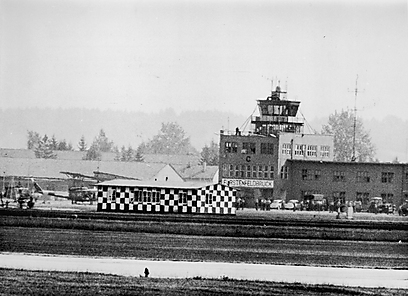
Airfield in Munich. Germans were not prepared. (Photo: Gettyimages)
At 11 pm, when the operation started, another cable was received in Jerusalem: "The terrorists and (our) bound guys have boarded the helicopter," the ambassador reported, noting that Genscher offered the terrorists to take him and other senior German officials as hostages instead of the Israelis until the negotiations are completed. The answer that was given: "We don't need Germans, we need Israelis."
The reports that followed described the chaos at the Munich airfield, where the terrorists and hostages were taken. Ben-Horin attempted to update Jerusalem about the unfolding events, but was hardly able to discern what was happening amid the exchange of fire and confusion. "A group of people are lying underneath one of the helicopters. They appear unharmed. Three people, not sure if they're terrorists or ours; they are lying motionless at a certain distance from the helicopter. Two terrorists have escaped, but are still in the area near the fence and are caught in the floodlights."
On September 6, at 12:50 am Israel time, Ben-Horin sends an update: "There were nine terrorists, four were killed and two escaped but are in the area and caught by flood lights. Two others are lying underneath the helicopter with our men. The condition of our men is unclear. A German police officer has been killed and two others were injured."
Over an hour later, Ben-Horin reports: "The shooting has stopped. Six out of the 8 terrorists were killed; two were arrested." Meanwhile, in Germany, official sources were reporting on the success of the operation, claiming that the hostages have all been rescued. Despite the encouraging news, Ben-Horin insisted that the celebrations are premature and that there is no official confirmation that the Israelis were rescued.
At 2:44 am, the Foreign Ministry receives a cable: "The ambassador is in the police briefing room; waiting for a final statement."
After long moments of anxious anticipation, the dreadful truth is confirmed: At 02:55 am Ben-Horin reports back that he was told that all the hostages had been killed. At 3:10 am Zamir confirms the report.
'No alternative programming'
According to the documents, after the first reports about the events in Munich, the Israeli government approached the West German government and the International Olympic Committee with a forceful demand to suspend the games as long as the hostages have not been released. The Israeli embassy in Washington was also involved in the contacts, and tried to put pressure on the American government to act to suspend the games. Meir even told the government the next day that President Nixon had called her and said that he had told the American delegation to stop its participation as long as the Israeli athletes were in danger.However, the embassy in Bonn reported that the heads of the Olympic Committee and the West German authorities had decided not to stop the games; among other things, because "German television has no alternative programming." Later, it was decided to suspend the games and conduct a memorial ceremony the following day for the two Israelis killed in the first few hours, which eventually became a memorial ceremony for all eleven murdered athletes.
The documents released by the State Archives provide a historic glimpse at the shock and frustration of the Israeli leadership and security establishment over the failed German rescue operation.
On 6 September 1972, after the full details of the massacre in Munich were revealed, deep mourning enveloped the State of Israel.
At 9 am a government meeting began, in a very somber atmosphere. Zamir, who personally witnesses the events at they unfolded, returned from Munich on the evening of September 6 and reported to Prime Minister Meir and Ministers Allon, Eban and Galili. Zamir described to the shocked ministers, with great emotion, the unfolding of the events – the rejection of his attempts at involvement in the operation, the chaos, the lack of professionalism and apathy displayed by the German forces.
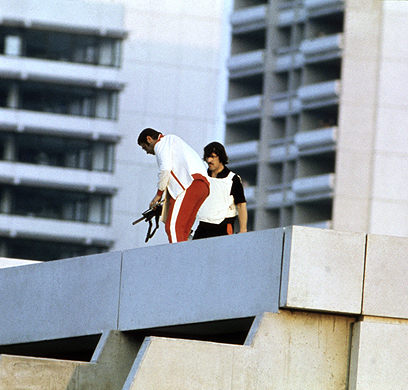
German forces at Munich airfield. (Photo: AFP)
"They didn't make even a minimal effort to save lives, didn't take even a minimal risk to save people, neither theirs nor ours", he said. In his opinion, the Germans only wanted to finish with this business, at all costs, in order to get on with the Olympics. When Golda asked him why in his opinion the Israeli delegation had not been guarded, he quoted the words of the security officer at the Israeli embassy in Bonn. The officer had asked the local police to provide protection for the delegation, and his reply was: "What are you thinking about? The Olympic spirit reigns here and nothing will happen."
Meir made it clear that this was a terrible story, "but it is a German matter… We are not responsible for what the Germans did." However, in view of Zamir's harsh report, the prime minister expressed some regret at the friendly message she had sent to Chancellor Brandt earlier, and at the praise in the government's statement for the Germans' efforts. She accepted Minister Galili's suggestion to send Brandt another message, with the information she had received from Zamir and a demand to investigate the events as soon as possible. Shortly after the meeting, a telegram that had been very carefully worded was sent to Brandt.
A day after his return, Zamir presented the prime minister with a detailed written report, in which he summarized the chain of events. He repeated the information given to the ministers on the previous day, but in a more organized and precise manner. He offered his conclusions as to the reasons for the failure of the operation, which was carried out "poorly and ineptly, which led to the tragic outcome." Together with a diagram of the situation at the airfield, the report was translated into English and sent to the West German government.
On 22 September Zamir also gave a report to the Knesset Foreign Affairs and Defense Committee. In reply to questions by the committee members, Zamir said that the Germans had had a plan and fully intended to rescue the hostages, but they were unable to improvise and devise solutions while the events were occurring. This partially accounted for the failure of the operation.
- Receive Ynetnews updates
directly to your desktop















